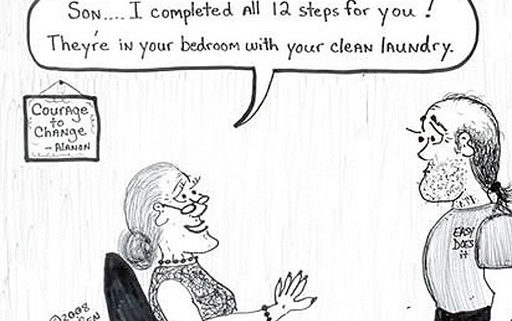How to Differentiate Between Helping and Enabling
I believe that enabling is motivated by LOVE and a desire to protect another person from pain.
This intention sounds compassionate and service-oriented, and it is to a degree. Yet, with life’s experience and 12 step knowledge, I have also learned that enabling is influenced by an overly developed sense of RESPONSIBILITY for others and a conscious or unconscious struggle with one’s own self-worth. I have experienced both sides of this struggle- at times putting others’ feelings above my own and almost a decade ago having my husband set loving limits with me when I went through a period of work addiction. I am truly grateful to my spouse for implementing consequences, which allowed me to realize that I had to change or my marriage would be in jeopardy.
I have met enablers who have the humble awareness to identify themselves as “Enablers” or “Rescue Warriors, Pleasers, Codependents, Caretakers, Too Nice”, etc. and even the desire to change, but often feel overwhelmed by the task in front of them because letting go of being there for their loved one (“detaching with love”) can be terrifying. I have also heard enablers admit in moments of courageous vulnerability that they do not want to change because “helping gives me a high”, “a shot of self-worth”, or “I’m afraid if I don’t help, this person will leave me.” Some enablers, on the other hand, do not view their behavior as enabling, but as helping someone who’s struggling “This is what families do! We don’t turn our back on our loved ones.”
So, what is the difference between helping and enabling?
Go to the end of this page for an easy to read & print handout. Or, read an abbreviated version below…
I view healthy helping as:
- Caregiving when another person is truly impaired and not able to be rehabilitated
- Providing emotional support only to your loved one- being there on the other end of the phone & unconditionally loving your family member (even if you don’t love their behavior)
- Allowing your loved one to experience uncomfortable or even painful consequences (having legal charges because they had drugs in their school locker or car, failing a class, getting a poor credit rating, having to live in a temporary shelter, not having a “smart phone” or car, losing a job, spending a night in jail, not inviting your loved one to a holiday meal, etc.)
I imagine for some of you just reading these consequences is incredibly anxiety provoking, yet for most of us, we don’t change until the pain exceeds the gain. And by depriving your loved one the experience of connecting the dots of his/her behavior and harmful consequences, we’re inadvertently enabling our loved one’s harmful behavior to continue.
I view enabling as:
- Caretaking- Doing something for someone else that they are capable of doing themselves. This behavior can disable another person because they lose practice & confidence in being self-reliant.
- Self-sacrificing to an extreme- leading to health issues, financial issues, relationship issues (lack of outside of loved one or conflicts) depression, exhaustion, and even death!
- Preventing, shielding, or rescuing someone from experiencing negative consequences or the WISDOM of their life decisions, which can cause them to repeat the same mistakes with dire consequences
How does one change from enabling to healthy helping?
Here are 3 tips to get you started:
(Fyi- Most folks find they need the help of a counseling professional with this expertise and/or support group like CoDA or Al-Anon/Nar-Anon.)
1. Change the “script” in this play called Life. If you are in the role of the enabler, by changing your lines and actions, your loved one will do the same. By you choosing “recovery”, it exponentially increases the chances for your loved one to also make positive changes.
2. Empower yourself by focusing on your own life (physical, emotional, intellectual, and spiritual health). Recovery involves healing from one’s past, believing in one’s worth, expressing one’s needs, & setting limits.
3. Empower others by allowing them to work through their struggles, fulfill their life’s responsibilities, & experience a sense of accomplishment. The message is, “I believe in your ability” and therefore will step out of your way to allow your life to be your journey.”
If you would like support in changing your enabling behavior to healthy helping, Contact Lana Isaacson, LCSW, CAC III, Certificate in Marriage & Family Therapy at 720.432.5262, [email protected], or schedule your free consultation or session on my online calendar.



